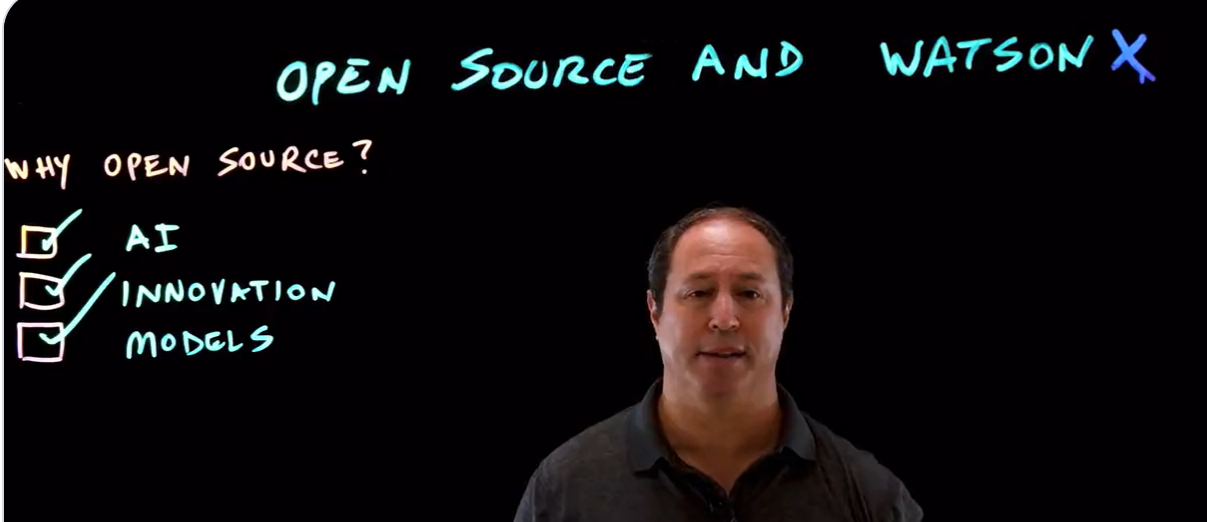Comments
- No comments found

Large long-established tech companies such as IBM hold the transformative power to democratize technology access through the creation of ecosystems.
Ecosystems where access to knowledge, resources, and opportunities is equitable, thus paving the way for a more inclusive and diverse technological future.
To explore this further I spoke with Savio Rodrigues, VP, Ecosystem Engineering & Developer Advocacy at IBM about developer enablement, training, and the Call for Code Global Challenge. We delved into IBM’s enduring commitment to developer advocacy, open-source initiatives, and the democratization of tech skills and education. Brilliant to see!
IBM's commitment to developers and open-source is long established - indeed decades-old! Over the years IBM has supported projects like Linux, Apache, and Eclipse but that’s evolved, of course, to now encompass emerging technologies such as AI, and quantum computing.
Savio explained that developer advocacy at IBM works with three key goals in mind:
Making developers successful by enhancing their skills, including whitespace developers and partners within IBM Ecosystem
Driving the adoption of IBM technology by promoting skills development
Active involvement in the open-source community to encourage innovation for the industry's benefit
Education around these projects has also become increasingly important, ensuring developers have the knowledge and guidance they need to use open-source technologies effectively. It’s part of a broader effort to upskill developers and technology users, and thereby democratize access to learning and skills development. For example, IBM’s Generative AI courses are designed to cater to a broad range of learners, not just developers.

The courses differentiate learners and meet them where they are in their learning journey, and don’t always immediately focus in on IBM products. Indeed, Savio suggested that when we talk about developer advocacy, we’re not always educating people who write code. IBM’s content is also relevant to business leaders like a data analyst or even a Chief of HR.
He pointed towards two courses as examples: NLP transformations utilizing Hugging Face and a course teaching users to create a chatbot with open source LLMs, neither of which mention IBM products in the course at all. However, these are two resources gaining considerable attention and interest, as they focus on tasks people are eager to learn about.
The content of IBM’s courses is created meticulously by experts who have previously curated material for over eight million learners on renowned platforms such as Coursera and edX
The course designs have undergone thorough evaluation to eliminate any learning challenges or content gaps, and the focus is primarily on imparting general AI skills rather than vendor-specific product knowledge. This approach is intended to meet the learners where they are in their AI journey, ensuring relevance and effectiveness.
Savio says the courses are constructed to be equally beneficial to those who have not traditionally been involved in the software development sector. By covering practical skills and focusing on disciplines such as prompt engineering and visual recognition using PyTorch, the initiative is a proactive response to the pervasive impact of AI across different industries.

Training and low barriers to access have the potential to create a ripple effect, benefiting individuals and their larger communities. When people are provided with opportunities for learning and growth, such as coding through a sponsored hackathon, they not only acquire new skills, but also gain a renewed sense of confidence too.
We see this deeply embedded in IBM’s "Call for Code" initiative, first initiated in 2018, and which fosters the innovative use of technology for societal advancement. The program empowers developers, encouraging them to acquire new, essential skills, particularly focusing on sustainability and artificial intelligence.
Savio mentioned that Call for Code has noticeably shifted towards Generative AI while it’s still as inclusive as always – welcoming participants from diverse skill sets and backgrounds, and promoting values like creativity, empathy, and emotional intelligence.
The program’s resonance with Gen Z is significant - aligning with their pursuit of purposeful work (Delloite Consulting research) and offering a glimpse into the benevolent potential of technology and data.
Training can help with ease of access to technology. But technology integration matters too – and in the current era integrated platforms are key, especially the focus on both hybrid cloud and AI. And that’s where IBM’s WatsonX comes in - something I also experienced first hand at a recent IBM TechXchange Conference!
IBM’s WatsonX offers three key foundational products: watsonx.ai, watsonx.data, and watsonx.governance, and is designed to act as a platform for AI and data management applications such as IBM Watsonx Assistant and IBM Watsonx Orchestrate. A superb video here presented by IBM Distinguished Engineer and Director of Open Technologies Brad Topol presenting the noteworthy open source #AI projects that lay a foundation for WatsonX.

Watsonx.ai serves as a modern studio for managing AI models, allowing users to employ IBM's models, alongside models from Hugging Face, or indeed their own. Watsonx.data is an advanced Lakehouse, accommodating both structured and unstructured data, supporting open data formats and engines.
In turn, watsonx.governance oversees the entire lifecycle, addressing the risks associated with the development of multiple models in a company, ensuring compliance with regulations across complex geographical boundaries, and mitigating financial risks.
According to Savio, the whole watsonx ecosystem is fuelled by open-source contributions and aims to empower developers with the tools and education needed to navigate and create within these technologies, ensuring productivity and compliance – but without compromising on innovation!
IBM's holistic approach to upskilling transcends traditional developer roles, underscoring the widespread applicability and relevance of AI and technology across various fields. The company’s meticulously crafted courses, emphasizing general AI skills, are testament to this commitment, ensuring learners from different domains grasp the profound impact of AI in their respective areas.
With platforms like watsonx, which integrates AI, data management, and governance, IBM is laying the groundwork for a future where technology is both accessible and equitably distributed.
A highly experienced chief technology officer, professor in advanced technologies, and a global strategic advisor on digital transformation, Sally Eaves specialises in the application of emergent technologies, notably AI, 5G, cloud, security, and IoT disciplines, for business and IT transformation, alongside social impact at scale, especially from sustainability and DEI perspectives.
An international keynote speaker and author, Sally was an inaugural recipient of the Frontier Technology and Social Impact award, presented at the United Nations, and has been described as the "torchbearer for ethical tech", founding Aspirational Futures to enhance inclusion, diversity, and belonging in the technology space and beyond. Sally is also the chair for the Global Cyber Trust at GFCYBER.
Dr. Sally Eaves is a highly experienced Chief Technology Officer, Professor in Advanced Technologies and a Global Strategic Advisor on Digital Transformation specialising in the application of emergent technologies, notably AI, FinTech, Blockchain & 5G disciplines, for business transformation and social impact at scale. An international Keynote Speaker and Author, Sally was an inaugural recipient of the Frontier Technology and Social Impact award, presented at the United Nations in 2018 and has been described as the ‘torchbearer for ethical tech’ founding Aspirational Futures to enhance inclusion, diversity and belonging in the technology space and beyond.
Leave your comments
Post comment as a guest